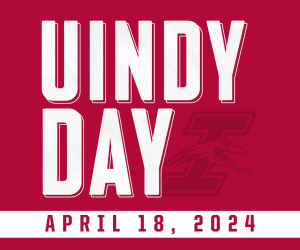The University of Indianapolis welcomed poet Adrian Matejka as part of the Kellogg Writers Series on April 13. Matejka read from three of his works to an audience in the Trustee’s Dining Room in the Schwitzer Student Center.
Matejka read from two of his published works and one collection of poems that is due to be published within the next year. The first set of poems were from “Mixology,” his second work, which won the 2008 National Poetry Series and was a finalist for the NAACP Image Award for Outstanding Literature—Poetry. He read “Seven Days of Falling,” “Tyndall Armory” and “This Be the Verse.”
Matejka also read poems from his soon-to-be published collection, “Collectible Blacks.” According to Matejka, “Collectible Blacks” is all about “coming back to Indiana.” The poems he read included “From the Get-Go Blacks,” “Unfunky UFO,” “Do the Right Thing,” “Map to the Stars” and “Boxing Out.”
The final selection of poems came from Matejka’s latest published work, “The Big Smoke,” which is all about boxer Jack Johnson, who lived and fought in the early 20th century. Matejka spent eight years researching Johnson and writing poetry before publishing the collection in 2013. “The Big Smoke” is a series of persona poems, written from the point of view of Johnson, his wife and his mistresses. It won the 2014 Anisfield-Wolf Book Award and was a finalist for the 2013 National Book Award, the 2014 Hurston/Wright Legacy Award and the 2014 Pulitzer Prize in Poetry.
From “The Big Smoke,” Matejka read “Battle Royal,” “Prize Fighter,” “Sporting Life” and “Alias.” Three of the other poems he read—“Texas Authorities Will Prosecute if He Takes White Wife,” “Carefree as a Plantation Darkie in Watermelon Time” and “A Struggle Between a Demon and a Gritty Little Dwarf”—were titled from and based upon newspaper articles about Johnson.
While Matejka read, videos of Johnson fighting various opponents during his career played. Sophomore creative writing and psychology double major Shannon Gaskin was impressed by the use of visuals.
“That is something I have never seen done, [showing] visuals while you read your poetry,” Gaskin said. “That definitely put him a step up.”
Matejka said that he got into poetry through rap.
“I wanted to be a rapper, and I was really bad at it,” Matejka said. “So I found poetry, which is very close to rap but didn’t require the same sophistication of persona. I didn’t have to create a character or become a kind of person who I am not. So I found poetry, and poetry values music, poetry values honesty and self the same way that rap music does, but you don’t have to worry about beats.”
Since finding poetry, Matejka has published three collections, with two more works to be published within the next year, one of which is a graphic novel. He also teaches as an Associate Professor of English at Indiana University in Bloomington and continues to write poetry as well.
“I just start with an image, something that sticks with me, and I carry it around for a long time until it shapes itself into a poem,” Matejka said. “I think of an image, and I find that thing. And I turn it, and I turn it, until I figure out some use for it as a story.”
Both Gaskin and sophomore creative writing major Anastasia Smith–Davis read “The Big Smoke” for their ENGL 325 Poetry course. The poems Matejka read from “The Big Smoke” were the ones Gaskin enjoyed the most.
“It was the realness of it,” Gaskin said. “He [Matejka] didn’t just give the positive side of this guy who’s making millions or even billions as a black person in the day and age when black people were lower than dirt. He gave the positives and the negatives. He put the stereotypes out there. He said exactly how Jack Johnson and the women in his life played into that stereotype.”
For Smith-Davis, hearing Matejka read the poems helped her to better understand them.
“[Matejka’s] reading the poems brought them to life,” Smith-Davis said. “You can just look at words on a paper and not understand the concept behind them. But when he sat there and gave us a back story on it, and then he started to read it, you could feel the passion.”
Smith-Davis was inspired by Matejka as a writer.
“He’s exactly what I want to be as a writer,” she said. “He talked about how sometimes you have to remove yourself from your work, so you don’t get lost. I value that a lot.”
Gaskin also was drawn to Matejka as a teacher.
“He [Matejka] is such a great writer,” Gaskin said. “Then you have this teacher who’s passing down his wisdom and what it took for him to get where he’s at. He’s helping other kids, bringing them out of their comfort zone because he wants them to be better.”
With three collections of poetry under his belt and more on the way, Matejka hopes that students and attendees at his reading will read some of his work.
“I just hope they read it,” Matejka said. “If I can get to that point, we’re good. I won. That’s all any of us would hope for, anybody writing poems, … that somebody would read it and get something out of it.”





